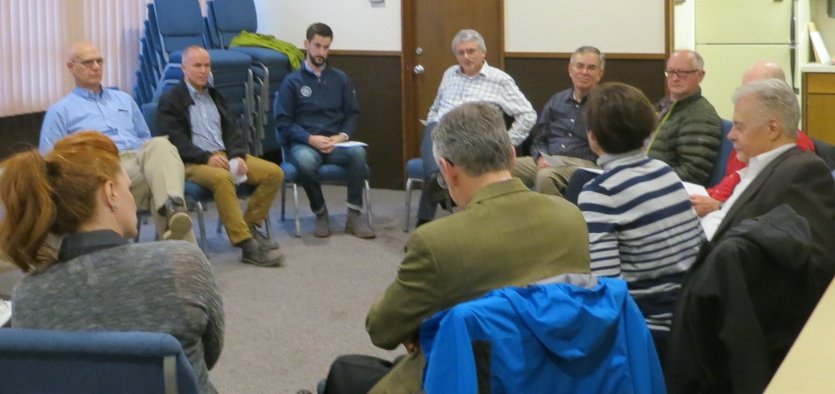
Attending: Steve Ulmer, Trevor Harris, Tom Ruhlman , Jimmy Skeen, John Bjorge, Svien Bjorge, John Aydelott, Ron Brooks, Ginny Chapman, David Marshall, Chris Johns, Jessica Ketola, Scott Sund, Bill Bear, Don Horrell and Jim Shemaria. Sixteen church leaders.
Introductions, A time of prayer and thanksgiving in small groups. A discussion followed. I might have missed some of the thoughts expressed. Sunday morning many worship services are a majority of one racial or ethnic group. Westgate has a very diverse congregation. People come from 35 nations, unified by common faith. Exchanging pulpits can overcome some barriers to reconciliation. This does happen especially where some congregations share a building. In contrast to a Sunday worship service, when the community is being served by a community dinner, then a more diverse group of people show up. Another diverse group at a church is the basketball court Wednesday evening filled with the many cultures in community nearby. Commonality of the sport overcomes differences. Churches like people have different gifts. Outreach to people who are hurting can overcome bias of different cultures. Addiction recovery is another community outreach that brings together people of different backgrounds. Racial and ethnic differences have sometimes perceived as an them vs. us perspective. Some of our group here today, have people in our own families that are different ethnicities. It changes the way you understand Black lives matter when it is your own children or grandchildren. To overcome the separation of groups we need to initiate the conversation. Take the pastor or person of a different race or ethnicity out to lunch. We need to make friends with people different then us.
We go across the world to do mission work but are reluctant to cross the street to connect with a neighbor from a different culture or race. We have separate congregations but all the kids from both congregations come to AWANA. We need to hold some joint services or celebrations like thanksgiving meal together with different ethnic congregations. Is our church/worship service welcoming to the people new to our country or community? Having flags from every nation represented in the congregation can help.
Shoreline of even twenty years ago was almost entirely white / European. Today the white population is becoming minority. Our Sunday morning services reflect the old Shoreline demographics but the future of the church depends upon us learning to embrace cultural and racial diversity. Perhaps what we should focus on is integration instead of reconciliation. We all want our congregations to reflect the diversity of our community but the reality is a Black children report they fear being attacked because they are Black. This is a result of institutionalized racism. Black people are far more likely to be stopped by police simply because they are Black.
There is an achievement gap for minority students in our schools. Many White children experience coming home and there is a parent to help with homework. For many minority children, recent immigrants, and those with parent(s) working the child is unable to get help with homework. Tutors and positive adults in the lives of minority students can do a lot to change their lives and show that someone besides their parents values them. We have done school grounds landscaping. We could be changing the academic and spiritual landscape if we can encourage our congregations to engage with the students in the school room and school yard. Schools actually are begging for our help. Churches in close proximity to a school could develop a partnership with principle, parents and teachers.
Refugees and immigrants are arriving from different parts of the world than in the past. No longer are they mainly from Europe, and Asia but most are from Africa, and the Middle East. Jesus / New Testament give examples of how to embrace these folks: the Good Samaritan, the 10 lepers, the woman at the well and Philip meeting the Ethiopian eunuch. We are commanded by Jesus to agape’ our neighbor even if they are different than us in race or culture or religion. Even if it is costly or embarrassing for us to do so. From Dr. Martin Luther King’s sermon on the parable of the Good Samaritan: “His question was not, what will happen to me if I stop to help this man? His question was, What will happen to him if I don’t? “
Scott Sund closed our time in prayer for us as the Church and us as the community to be reconciled. We agreed to meet again and invite others who were not here to join, especially those who are from different ethnic backgrounds.
Recent Comments